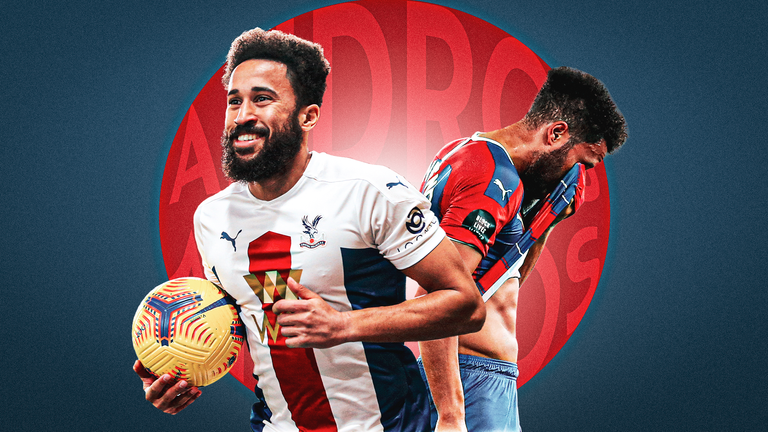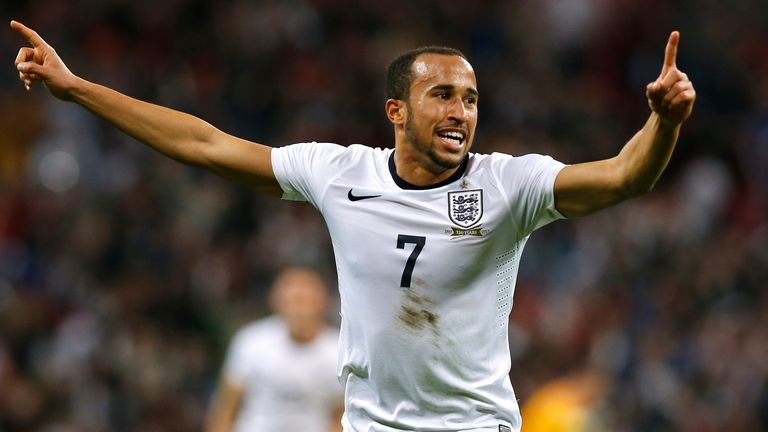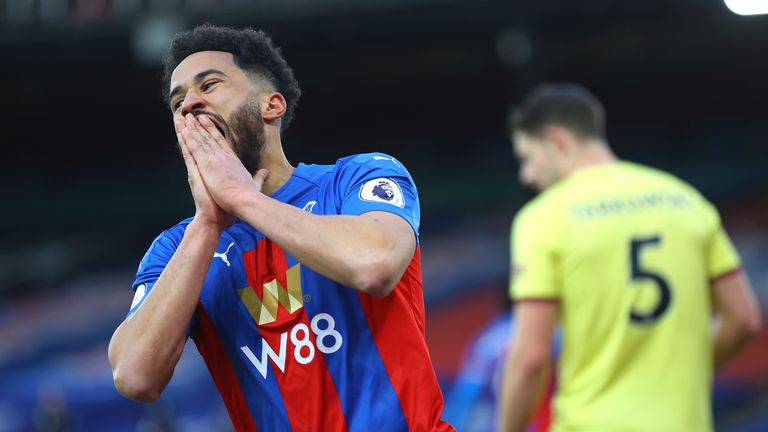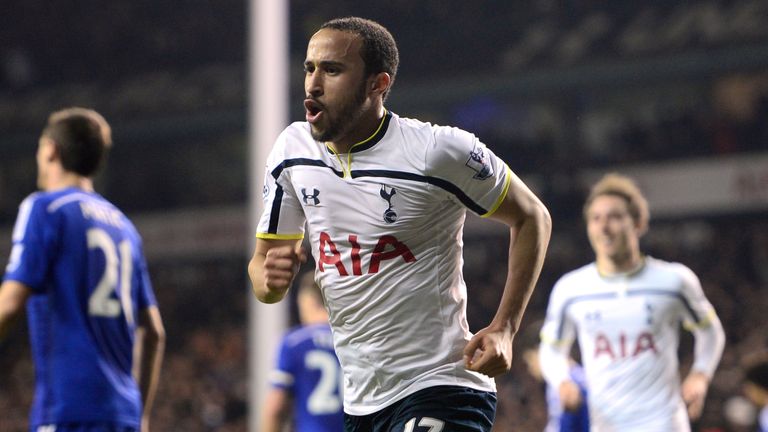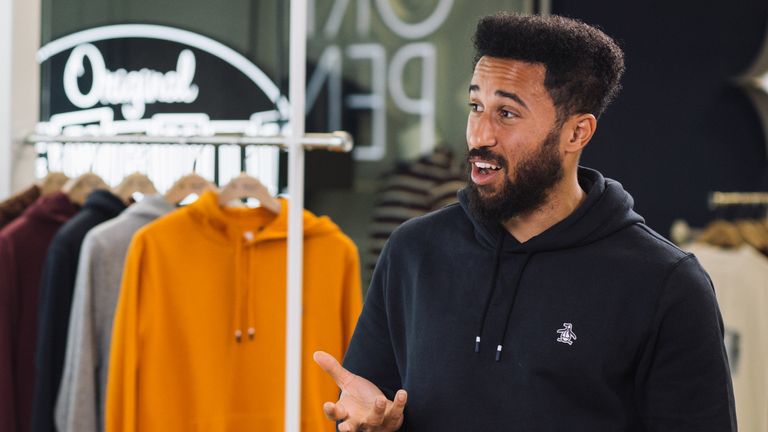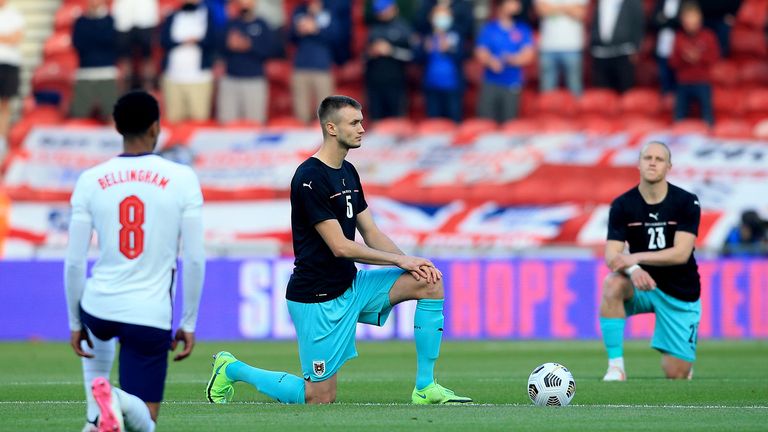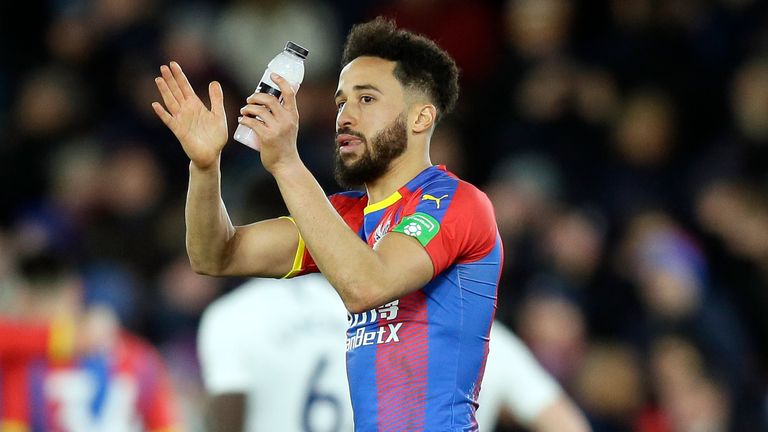Andros Townsend exclusive interview: Overcoming a gambling addiction and helping others do the same
Crystal Palace winger Andros Townsend, formerly of Tottenham, Newcastle and England, opens up to Sky Sports about how he overcame a "crippling" gambling addiction and why he is determined to help others do the same
Tuesday 8 June 2021 12:08, UK
Andros Townsend chuckles as he remembers driving between the parks and green spaces of London in the summer of 2016, stopping at each one to get out of the car and bury his head in his phone.
Like many at the time, Townsend was scouring the capital for Pokémon, swept up in a virtual craze that captivated millions. In his case, though, the idle pastime was serving an important purpose.
"If you spend 10 hours a day gambling and then you try to cut it out, you're just going to be thinking about placing bets," Townsend tells Sky Sports.
"I got into gambling in the first place because I had that addictive personality, so when gambling wasn't there, my first thought was always, 'Right, what's the next thing?'
"You need to find ways of occupying your mind - whether that's by playing FIFA, learning a new language, taking up a new hobby or a new skill or whatever else.
"I've done all of the above and as silly as it sounds, stuff like Pokémon Go helped me massively in getting out of that crippling addiction."
In the depths of his addiction, when he was a young player bouncing between loan spells away from his boyhood club Tottenham, Townsend recalls losing £46,000 on a single match.
A habit which started as a means of passing the time between training sessions and matches had spiralled wildly out of control. Not long after that, in May 2013, he was charged with breaching betting regulations by the Football Association.
Townsend, who is currently weighing up his future as he nears the end of his Crystal Palace contract, was handed a suspended 12-month ban and ordered to attend counselling as part of his sentence.
He looks back on it now - eight years, 13 England caps and 218 Premier League appearances later - as a pivotal moment in his life and career.
But the road to recovery was a long one.
"Bizarrely enough, I still didn't realise I had a problem at that time," he says. "I was making out as if I'd just made a mistake and that going for counselling at Sporting Chance was just something I had to do, so I didn't fully open up and see the benefits."
That took a lot longer.
Indeed, it wasn't until 2019 that Townsend finally felt ready to speak publicly about his struggles with addiction in an article for the Players' Tribune - and it wasn't until seeing the reaction to that article that he realised he could use his experience to help others.
"The main thing was the outpouring of support I received from the general public, but I also had footballers I'd never heard of or spoken to contacting me on social media and asking how I got through it.
"Team-mates, former team-mates, young players going through the same thing... I had all kinds of people calling me up, asking me for help and wanting to get my advice.
"I think I was very selfish when I was young. I only ever thought about myself. If something wasn't benefitting me, I wasn't interested.
"But after the article, I had a lightbulb moment. It made me see the platform, the voice and the audience that I had, and it made me realise I need to do stuff that helps others, not just myself.
"Now, every time I get the opportunity to speak up and have the awkward and uncomfortable conversations about the low points in my career, I'm just as happy to do that as I am speaking about all the high points."
Townsend is doing just that for this interview, carried out over Zoom as part of Original Penguin's #UnderTheSurface campaign in association with the Campaign Against Living Miserably charity.
Last year, a House of Lords report found that 300,000 people in Britain are addicted to gambling while millions more are at risk of falling into the same fate. The figures are shocking and Townsend has seen the issue's prevalence within football first-hand.
"In every dressing room I've been in, there's been a player who has had a gambling addiction," he says.
"Obviously, I've only seen what's on the surface because people don't always speak about it, but in every dressing room there has been a player who's always gambling on the apps and placing bets.
"I think it's something that's very common. The outpouring of messages I received after I spoke out about it for the first time told me that it's a problem in football as well is in society generally."
Townsend's main piece of advice for anyone struggling with addiction is to reach out to the people closest to them. It is vital, he says, to "normalise" conversations around mental health.
"It's all through talking," he says. "You can speak to a psychologist if you want - they're great and I've spoken to many in the past - but it can just be a simple conversation with your team-mate, your friend, your mum, your dad, your girlfriend, your brother, your sister…
"Just having a conversation and telling someone close to you about your worries and getting those things off your chest. That, for me, in the past, has felt like a weight off my shoulders.
"When people are told they have to talk to someone, they think that means paying for a shrink who's looking down their nose at you and charging you by the hour, but that's not the case. It's just about having conversations with your nearest and dearest."
A degree of acceptance is also necessary.
"With gambling addictions, I think it also needs to come from within," adds Townsend. "One day, you have to wake up and realise you're chasing losses you're never going to claw back.
"You have to accept that what's gone is gone and put it to one side."
Townsend, now 29, feels football still has plenty of catching up to do with regards to its treatment of mental health issues but he is encouraged by how attitudes are gradually shifting.
"It is still a bit of a taboo subject in football and still carries a bit of stigma," he says. "But the fact that players, team-mates and ex-team-mates are coming to me for advice having been through the same stuff shows we've come a long way.
"If I go back five or 10 years, I was in a situation with one of my close friends going through the same struggles with gambling addiction, and we never once spoke about it. I think we've come a long way since those times but there's definitely still a lot of work to do."
Townsend is grateful for the schooling he received in Tottenham's academy - "I was fortunate because they try to shape the human just as much as the player," he says - but the pitfalls of professional football can be difficult for anyone to avoid.
He fears many young players today are "unprepared" psychologically for everything that comes with the step up and feels the transition has become even tougher in the social media age.
Townsend has learnt to shut out the noise but he acknowledges it is not easy for those in the early stages of their careers.
"You're always taught to not get carried away with the highs and not read too much into the lows and that's the way you have to do it," he says.
"On more than one occasion after I've had a bad game, I've deleted the apps to stop myself from going on them.
"I'm 29 now, so I know what it's like. I've been through everything and I know what's coming my way if I open one of those apps after a defeat.
"I try to stay off social media at least over the weekend and maybe even until the next game."
It is sad that it has come to that but Townsend is heartened by how the footballing community has come together in response to the continued abuse and racism aimed at players on social media.
England's players will continue to take a knee at this summer's European Championship, despite the protestations of some supporters at their recent warm-up games, while last month a four-day social media boycott drew support from up and down the football pyramid.
"We've always been taught growing up to not let it affect us, to ignore it and be proud of what we are and where we came from," says Townsend.
"It's only in the last year that we've thought, collectively, that we're not going to accept it and we're going to speak up.
"You're seeing now a group of individuals pushing back and not accepting racist abuse online on a daily basis. We are starting to fight back and hopefully we will see real change in the near future."
For Townsend, there could be change coming on a footballing level too following five successful seasons with Crystal Palace.
"I'm very proud of the last five years," he says. "To get that consistent Premier League football, which I didn't have before, and to stay injury-free has made me really happy.
"I was brought in at a time when the club wanted to kick on and break the top 10 and unfortunately that hasn't happened. But I'm pleased with what I've achieved. I'll sit down with my agent this summer and decide my next step."
It remains to be seen where Townsend's next step will take him but right now he is just happy to be raising awareness about the dangers of gambling addiction - and using the lessons of his past for the benefit of others. "If I can help just one person from doing this interview today," he says, "then I will feel like I have done my job."
Townsend was taking part in the Original Penguin x Campaign Against Living Miserably #UnderTheSurface campaign. To find out more, head to www.originalpenguin.co.uk/pages/calm-underthesurface.
Need support? Worried about someone? The Campaign Against Living Miserably's helpline and webchat are open daily 5pm to midnight. Alternatively, you can get in touch with Samaritans on 116 123 - 24 hours a day, seven days a week. For gambling addictions, you can also find support at GamCare.
Crystal Palace have a partnership with GAMSTOP - a free service that allows people with gambling problems to exclude themselves from online gambling sites. For their employees and players, they have an employee assistance programme which provides counselling support. They also have designated mental health first-aiders throughout the club to help those who may be in crisis.

